Warmer seas 'may change fish menus'
- Published

Warming seas will push traditional fish favourites off the British menu, a study suggests.
Fish such as haddock, plaice and lemon sole will decline as the North Sea warms by a predicted 1.8 degrees over 50 years, say scientists.
But other species such as John Dory and red mullet will shift their range into UK waters, according to modelling work.
Consumers wishing to eat locally-caught fish will need to change their diet, say University of Exeter researchers.
The classic fish and chips enjoyed by previous generations could be replaced by the likes of sardines and squid, according to a study published in the journal Nature Climate Change.
The research combined long-term data on popular North Sea fish, including haddock, hake, lemon sole, plaice and dab, with climate model projections from the Met Office for the next 50 years.
As seas warm, some species will be able to move north and adapt, but others, such as many types of flat fish, will be unable to cope with deeper, rocky waters, scientists predict.
This will change what fishing boats catch in the North Sea - with the likes of cod and haddock moving further North beyond UK waters and other species declining, said marine biologist at Exeter University, Stephen Simpson.
"The flat fish are really in trouble," Dr Simpson, a researcher on the study, told BBC News.
"Unless they can change their habitat and diet in the next 20 or 30 years, or adapt to 2 degrees more warming - which is a big ask - then they will decline."
Changing of the guard
But he said it was "not all doom and gloom" as warmer water fish were likely to take the place of flat fish.
John Dory, red mullet, gurnard, sardines, anchovies, cuttlefish and squid would all become more common in the North Sea, he said.
"It's a changing of the guard - the waters around the UK will become more like Spain and Portugal and so will the fish," he explained.
"If we can learn to eat them, then British fisheries can be very productive. It will mean changing the British diet, if we want to be catching and eating local fish."
Dr Peter Richardson of the Marine Conservation Society said the study confirmed "that we have to be much smarter and more precautionary in the way we manage our fish stocks".
"We cannot continue to be so cavalier with such a valuable resource and expect it to be resilient to the impacts of climate change."
Follow Helen on Twitter.
- Published18 July 2013